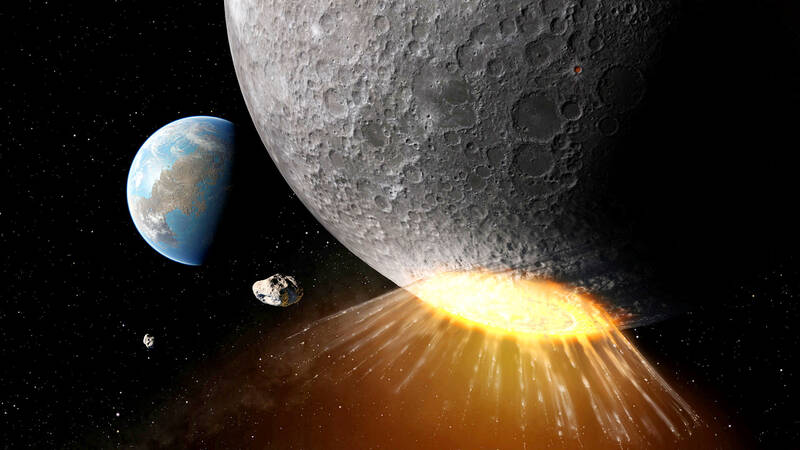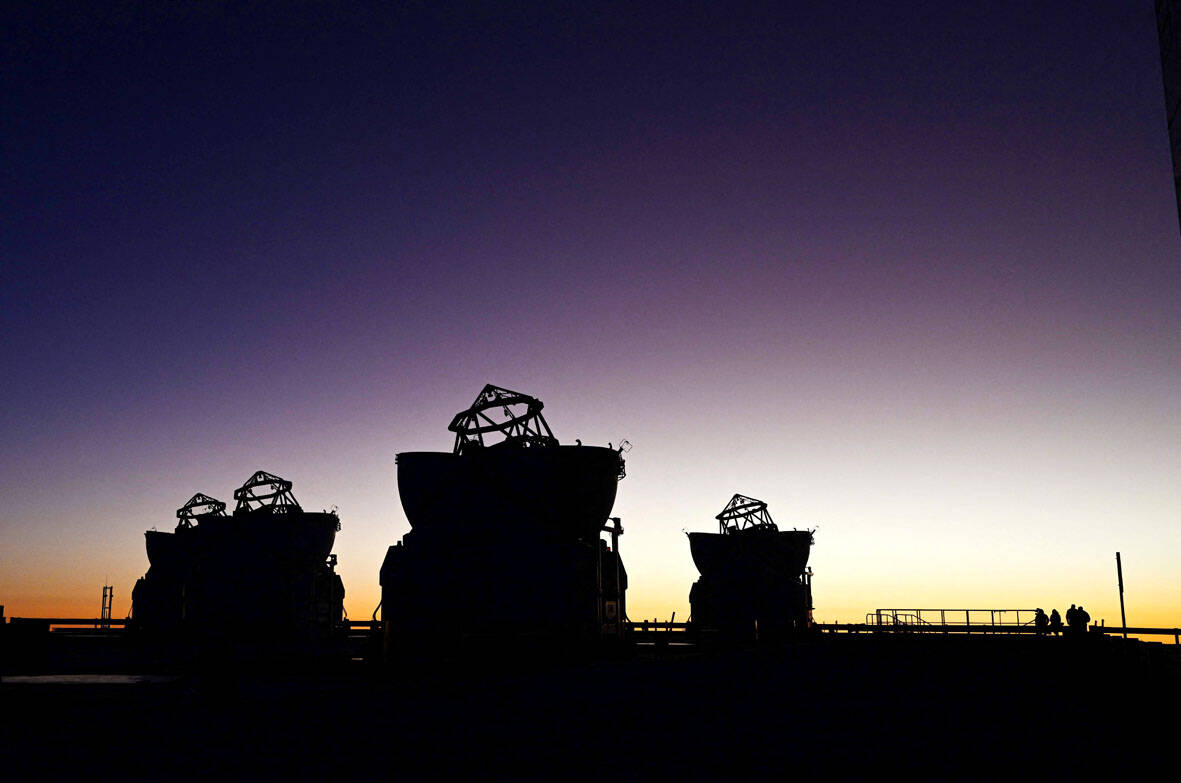China has begun recruiting for a planetary defense force after risk assessments determined that an asteroid could conceivably hit Earth in 2032.
Job ads posted online by China’s State Administration of Science, Technology and Industry for National Defence (SASTIND) this week, sought young loyal graduates focused on aerospace engineering, international cooperation and asteroid detection.
The recruitment drive comes amid increasing focus on an asteroid with a low — but growing — likelihood of hitting earth in seven years. The 2024 YR4 asteroid is at the top of the European and US space agencies’ risk lists, and last week analysts increased their probability assessment of it hitting Earth from 1.3 percent to 2.2 percent. The UN’s Space Mission Planning Advisory Group, comprising countries with space programs including China, have been meeting regularly to discuss a response.

Photo: Reuters
The ads, posted to WeChat earlier this week, listed 16 job vacancies at SASTIND, including three for a new “planetary defense force.” They invited applications from recent graduates aged under 35, with professional and technical qualifications and “a firm political stance” supporting the Chinese Communist party and an ideology aligned with its leader, Xi Jinping (習近平).
The ads prompted widespread online discussion among young people — a demographic that saw unemployment rates reach a record high in 2023.
“The Earth would depend on you three. Isn’t that stressful?” asked one person.

Photo: AFP
“If you succeed, you’re a hero who saves the world,” said another popular comment on Weibo. “But no one would punish you for failing, I mean, there be literally ‘no one’ left.”
Job descriptions attached to the ads suggest the force will have a key focus on international cooperation, and on designing systems for new and experimental technology. The planetary defense force jobs are described as “research on monitoring and early warning of near-Earth asteroids,” and required graduates with a masters degree or higher, with majors in astrophysics, earth and space exploration technology and aerospace science and technology.
China’s aerospace sector is advancing, and it’s not clear the recruitment has been specifically prompted by the discovery of the asteroid. SASTIND did not respond to requests for comment.

Photo: AP
Andrew Jones, a correspondent at SpaceNews specializing in China’s sector, said the timing of recruitment appeared to be coincidental with the discovery of 2024 YR4, and the jobs were likely “supplemental to China’s already established efforts to develop its planetary defense capabilities.”
“This includes monitoring and warning systems, both on the ground and potentially in space, and preparing to test measures such as kinetic impactors to alter the orbits of threatening asteroids.”
Deflecting an asteroid like 2024 YR4 appears to be a key focus of China’s aerospace development, including plans to replicate the 2020 Double Asteroid Redirection Test (Dart), conducted by NASA. The Dart involved crashing a spacecraft into a 160-meter-long asteroid named Dimorphos, successfully diverting its trajectory for the first time. The European Space Agency later launched another spacecraft to observe and report on the impact the Dart had on Dimorphos.
China is also preparing its own asteroid-redirection test, on a smaller asteroid named 2015 XF261, in 2027. But Harrison Agrusa, a planetary scientist at the Observatoire del la Cote d’Azur said there are concerns about the smaller size of the asteroid China is targeting.
“Given what we learned from Dart, a similar impactor mission onto a much smaller target would likely fully disrupt it,” he said. “This may not be the most useful mitigation strategy, as you can potentially create an even bigger problem by turning a single projectile (with a known trajectory) into many fragments (with unknown trajectories).”
Harrison said there was no need to be overly alarmed about 2024 YR4, noting that multiple countries and aerospace organizations were working together on it.
“We know we have the capability to deflect an asteroid like this, as demonstrated by the Dart mission. So this asteroid doesn’t need to be feared, it just needs to be studied and understood.”

Jacques Poissant’s suffering stopped the day he asked his daughter if it would be “cowardly to ask to be helped to die.” The retired Canadian insurance adviser was 93, and “was wasting away” after a long battle with prostate cancer. “He no longer had any zest for life,” Josee Poissant said. Last year her mother made the same choice at 96 when she realized she would not be getting out of hospital. She died surrounded by her children and their partners listening to the music she loved. “She was at peace. She sang until she went to sleep.” Josee Poissant remembers it as a beautiful

March 2 to March 8 Gunfire rang out along the shore of the frontline island of Lieyu (烈嶼) on a foggy afternoon on March 7, 1987. By the time it was over, about 20 unarmed Vietnamese refugees — men, women, elderly and children — were dead. They were hastily buried, followed by decades of silence. Months later, opposition politicians and journalists tried to uncover what had happened, but conflicting accounts only deepened the confusion. One version suggested that government troops had mistakenly killed their own operatives attempting to return home from Vietnam. The military maintained that the

Before the last section of the round-the-island railway was electrified, one old blue train still chugged back and forth between Pingtung County’s Fangliao (枋寮) and Taitung (台東) stations once a day. It was so slow, was so hot (it had no air conditioning) and covered such a short distance, that the low fare still failed to attract many riders. This relic of the past was finally retired when the South Link Line was fully electrified on Dec. 23, 2020. A wave of nostalgia surrounded the termination of the Ordinary Train service, as these train carriages had been in use for decades

Lori Sepich smoked for years and sometimes skipped taking her blood pressure medicine. But she never thought she’d have a heart attack. The possibility “just wasn’t registering with me,” said the 64-year-old from Memphis, Tennessee, who suffered two of them 13 years apart. She’s far from alone. More than 60 million women in the US live with cardiovascular disease, which includes heart disease as well as stroke, heart failure and atrial fibrillation. And despite the myth that heart attacks mostly strike men, women are vulnerable too. Overall in the US, 1 in 5 women dies of cardiovascular disease each year, 37,000 of them